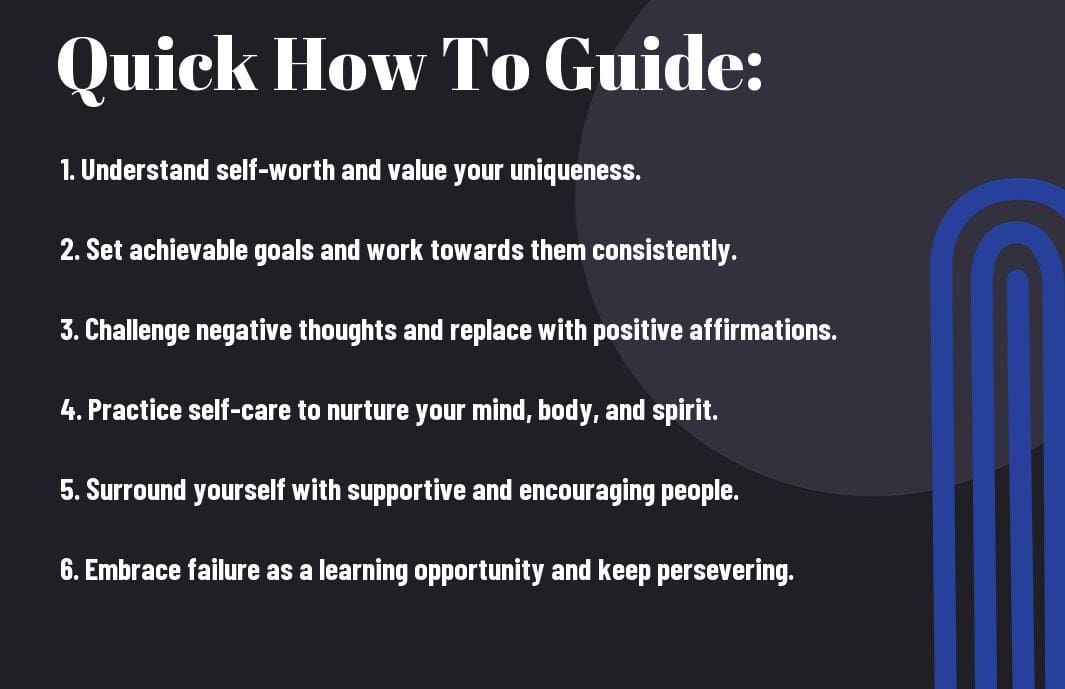Key Takeaways:
- Self-awareness is the foundation: Understanding your strengths, weaknesses, and values is crucial in building self-confidence.
- Set achievable goals: Break down your goals into smaller, manageable tasks to build a sense of accomplishment and confidence.
- Practice self-compassion: Be kind to yourself, learn from failures, and celebrate your successes to nurture a healthy self-confidence.

Laying the Foundation for Self-Confidence
Assessing Current Confidence Levels
Some individuals may underestimate or overestimate their actual level of self-confidence. To accurately measure your current confidence levels, take note of how you handle challenges, setbacks, and new opportunities. Reflect on past achievements and areas where you may have felt less secure. Understanding your starting point is crucial in developing a strategy to build genuine self-confidence.
Identifying Internal and External Confidence Barriers
On your journey to self-confidence, it’s vital to recognize the internal and external factors that might be hindering your progress. Internal barriers could include self-doubt, negative self-talk, or limiting beliefs about your abilities. External barriers might involve unsupportive relationships, societal pressures, or past failures affecting your self-esteem. By acknowledging and addressing these barriers, you can create a solid foundation for cultivating complete self-confidence.
Psychological Factors Influencing Self-Confidence
If you want to cultivate complete self-confidence, it’s imperative to understand the psychological factors that can either boost or hinder your confidence levels. Self-confidence is influenced by various internal and external factors that shape how you see yourself and interact with the world.
The Power of Positive Thinking
You have the power to shape your self-confidence through the way you think. Positive thinking involves cultivating a mindset that focuses on optimism, gratitude, and self-empowerment. By directing your thoughts towards positive outcomes and possibilities, you can enhance your self-confidence and outlook on life.
Overcoming Self-Doubt and Negative Self-Talk
While self-doubt and negative self-talk can be detrimental to your self-confidence, they are common challenges that many people face. Overcoming these obstacles requires self-awareness, self-compassion, and a willingness to challenge negative beliefs. By replacing negative self-talk with positive affirmations and practicing self-compassion, you can build resilience and boost your self-confidence.
Another important aspect of overcoming self-doubt and negative self-talk is seeking support from mental health professionals or therapists who can provide strategies and tools to help you address and manage these challenges effectively.
Perceiving your self-worth and capabilities accurately plays a crucial role in nurturing self-confidence and achieving your goals. It’s important to recognize and address any negative thought patterns or beliefs that may be holding you back from realizing your full potential.
Practical Tips for Building Self-Confidence
Once again, cultivating self-confidence is a journey that requires consistent effort and dedication. Here are some practical tips to help you build complete self-confidence:
- Establish achievable goals: Setting clear and attainable goals is crucial in boosting your self-confidence. By breaking down larger goals into smaller, manageable tasks, you can track your progress and celebrate your successes along the way.
- Develop a routine for success: Consistency is key in building self-confidence. By establishing a daily routine that includes positive habits such as exercise, healthy eating, adequate sleep, and regular self-reflection, you can cultivate a sense of control and mastery over your life.
Establishing Achievable Goals
Clearly defining your goals can provide you with a roadmap to success. Start by identifying what you want to achieve, breaking it down into smaller steps, and setting specific deadlines for each milestone. This will not only help you stay focused but also give you a sense of accomplishment as you reach each goal.
Developing a Routine for Success
Any endeavor requires consistency to see results, and developing a routine for success is no exception. Start by creating a daily schedule that prioritizes self-care, productive work, and personal growth activities. Routine helps in creating a sense of stability and discipline in your life, allowing you to stay on track towards your goals.
Routine is the backbone of success. It provides structure, minimizes distractions, and fosters a sense of discipline. By following a consistent routine, you can create positive habits that reinforce your self-confidence and propel you closer to your ambitions.
After establishing your goals and developing a routine for success, you will be well on your way to building the self-confidence you desire.

Strengthening Self-Confidence through Action
How to Apply Self-Confidence in Daily Interactions
Not only does self-confidence shape how we view ourselves, but it also influences how others perceive us. By exuding self-assurance in our daily interactions, we can attract positivity and respect from those around us. Assuming a confident posture, making eye contact, and speaking assertively are all ways to apply self-confidence in our interactions with others.
Embracing Challenges and Learning from Failures
Through embracing challenges and learning from failures, individuals can build a strong foundation of self-confidence. Challenges provide opportunities for growth and self-discovery. By pushing ourselves out of our comfort zones and tackling challenges head-on, we not only prove our capabilities to ourselves but also cultivate resilience and confidence. Learning from failures is equally necessary; it allows us to refine our skills, adapt our strategies, and emerge stronger.
Challenges: Embracing challenges and learning from failures can be daunting, but it is in facing these obstacles that we truly grow. The process may involve stepping into the unknown, confronting fears, or risking failure. However, by embracing these challenges, individuals can unlock their full potential, discover new capabilities, and build unwavering confidence.
Maintaining and Enhancing Self-Confidence
How to Stay Confident in the Face of Adversity
To cultivate complete self-confidence, it is crucial to learn how to stay confident in challenging situations. On days when you face adversity or setbacks, remind yourself of your strengths and past accomplishments. Remember that challenges are opportunities for growth and they do not define your worth. Practice positive self-talk and surround yourself with supportive, uplifting people who believe in you. Focusing on solutions rather than problems can also help you navigate tough times with confidence.
Continuous Self-Improvement Strategies
Self-confidence is a trait that can be continuously nurtured and developed through self-improvement strategies. With a growth mindset and a commitment to personal growth, you can enhance your self-confidence over time. Set specific, achievable goals for yourself and work towards them consistently. Engage in regular self-reflection and identify areas for improvement, seeking feedback and learning from your mistakes. Embrace challenges and step out of your comfort zone to expand your skills and capabilities, fueling your self-confidence.
The journey to maintaining and enhancing self-confidence is an ongoing process that requires dedication and perseverance. By staying resilient in the face of adversity and continuously seeking opportunities for self-improvement, you can cultivate a strong sense of self-assurance that will propel you towards success in all areas of your life.
FAQ
Q: What is self-confidence and why is it important?
A: Self-confidence is the belief in one’s ability to succeed or meet the challenges of life. It is crucial for personal growth, achievement, and overall well-being. With self-confidence, individuals are more likely to take on new opportunities, handle setbacks effectively, and maintain a positive outlook.
Q: How can I cultivate self-confidence?
A: Cultivating self-confidence requires a combination of self-awareness, self-compassion, and practice. Start by setting realistic goals, acknowledging your strengths, and challenging negative self-talk. Practice self-care, surround yourself with supportive people, and seek feedback to build confidence over time.
Q: What are some practical tips for boosting self-confidence?
A: Here are some practical strategies to boost self-confidence:
- Set achievable goals and celebrate small victories
- Practice positive self-affirmations and visualization exercises
- Step out of your comfort zone and embrace challenges
- Take care of your physical and mental well-being through exercise, mindfulness, and relaxation techniques
- Learn from failures and reframe them as opportunities for growth
- Seek support from mentors, coaches, or therapists to work through any underlying issues affecting your confidence
Consistent effort and a positive mindset are key to cultivating complete self-confidence.




